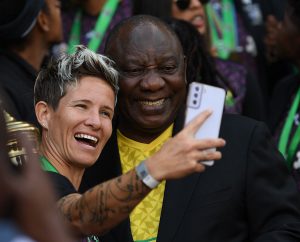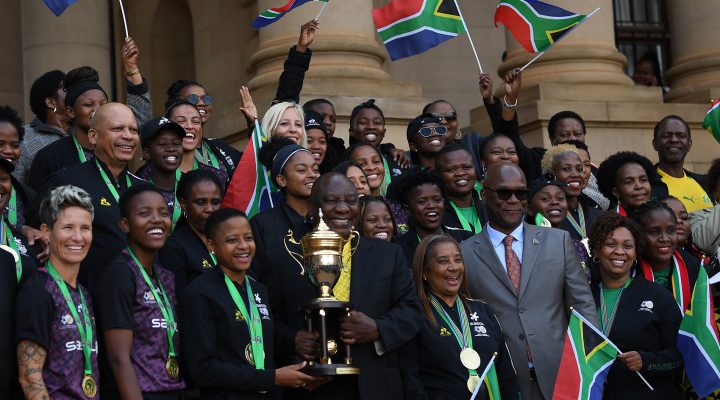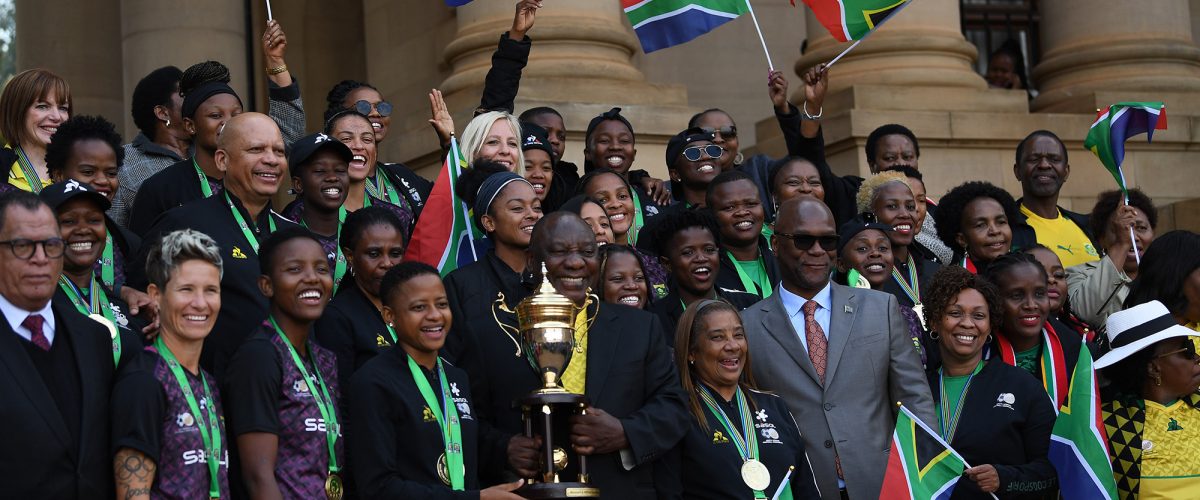There is a lingering giddy feeling that comes with winning a major sports competition. If in doubt, ask South Africans.
Since July 23, when the country’s women’s national soccer team, Banyana Banyana, won the Women’s Africa Cup of Nations in Morocco — the first time in the country’s history it has achieved such feat — the euphoria of victory has yet to die down.
From the top government officials in Pretoria, to the commoners in KwaZulu Natal, Soweto, Kimberly or Limpopo, the feel-good feeling remains palpable. And there’s no predicting when it could end as people in the country continue to recount the magic performed by Banyana Banyana.
The South African team defeated host nation Morocco 2-1 in the final game.
The excitement was such that even before the victorious team arrived home from Morocco, a debate was raging among South Africans about the disparity in the pay received by the team compared to their male counterparts — whose performances over the past two decades have been less than outstanding.
Even before the victorious team arrived home from Morocco, a debate was raging among South Africans about the disparity in the pay received by the team compared to their male counterparts.
As in many countries, women’s football (soccer) in Africa lags behind the men’s’ teams in terms of investment, revenue and reward.
Casting aside their racial differences and socio-economic challenges — which includes a high unemployment rate and inflation worsened in recent months by the effects of the Russia-Ukraine war — South Africans chose to use the opportunity of the Banyana Banyana victory to question the unequal treatment of men and women.
At O.R. Tambo International Airport in Johannesburg, where many fans converged in wait for the team’s return, one of the joyous fans declared: “Banyana Banyana make us proud. SAFA (South African Football Association) must give Banyana Banyana what they are worth, not small money.”
Hosting the Banyana Banyana team after they arrived home, President Cyril Ramaphosa gushed: “Today our hearts are filled with pride. They are bursting at the seams with a great deal of joy because you, Banyana Banyana, promised that you would bring the cup back home, and you have brought it home.”

President Cyril Ramaphosa take a selfie with South Africa captain Janine van Wyk during the South Africa women’s national soccer team trophy celebration with President Cyril Ramaphosa at Union Buildings on July 27, 2022 in Pretoria, South Africa. (Photo by Lefty Shivambu/Gallo Images/Getty Images)
He continued, “The good news of your win was like rain falling on dry and parched ground. You have through your victory lifted the hearts of our nation in the midst of the many challenges our country faces. You have given us reasons to put aside our differences, to put aside for a while our troubles, our anguish about a whole number of things like load shedding. You enabled us to embrace one another, and such is the power of sport, because for a while we were able to put away our many other issues and unite as a nation.”
As a way to show the country’s gratitude for the honor brought to it by Banyana Banyana, Ramaphosa said the women deserve to be rewarded for their labor and that the wage disparity between them and their male counterparts would be scrapped.
“I do believe we must do good by you. I do believe that you deserve much more. You deserve equal pay for equal work that you do. I have been told that you get 10 times less than what the men get when they play. That has to come to an end. We are a non-racial, democratic and non-sexist country. I am equally opposed to unequal pay, and it must come to an end. … I would love to see these women who have made South Africa so proud to be given added remuneration,” he said, eliciting cheers from the team.
If Ramaphosa’s plan comes to pass, it would be following in the footsteps of the United States, where the success of the Women’s National Soccer Team sparked agitation for equal pay and treatment by its members that finally led to authorities discarding the wage disparity between female and male counterparts. And similar change in South Africa could help bring about change elsewhere in the African continent.
One prominent place where such change is hoped for is Nigeria, home of the most successful women’s soccer team in Africa, having won the WAFCON competition nine times in 12 competitions.
Despite the Super Falcons numerous successes, Nigerian soccer authorities repeatedly have failed to address concerns that the women are regarded less than the men. The government has not responded to the urging of fans or boycotts by the players themselves.
Aside from winning the WAFCON competition nine times, the Super Falcons never have failed to reach the semifinals of the competition. Since 1991, the Nigerian women’s team has qualified for every FIFA Women’s World Cup, although with little success to show for it. Still, the Super Falcons’ performance has been at variance with their male counterparts for decades. The men have managed only three Africa Cup of Nations victories since 1980.
Gowon Akpodonor, a Nigerian sports journalist who has covered many sporting events around the world, admits that the South African plan to do away with gender wage discrimination is a step in the right direction, but he doubts the same thing can be replicated in Nigeria.
“I think such practice may not take place in Nigeria for now because those in charge of our football don’t reason the same way others do.”
“You will recall that women players in the United States have been in the forefront of the struggle,” he said. “I am glad it is (now happening in) Africa. However, I think such practice may not take place in Nigeria for now because those in charge of our football don’t reason the same way others do. They always believe in cutting corners and using the players against one another. To pay camp allowances is a big problem, not to talk of giving the women and men same wages.
“Until we have people who reason like normal people at the NFF, I think such an idea won’t see the light of day in Nigeria,” he said.
Meanwhile, other African countries not only need to institute equal pay for equal work, as Ramaphosa put it, but need to create a broader, more sustainable blueprint to make women’s football attractive by investing more in the game.
At the moment, the Confederation of African Football, organizers of the game in Africa, did well by last year instituting the CAF Women’s Champions League to exist side by side with the men’s team.
“The successful planning and hosting of the CAF Women’s Champions League was an important milestone for the female game in Africa,” said Sarai Bareman, FIFA’s chief women’s football officer. “It provided clubs the chance to showcase their talent, and what we have seen has been extremely impressive. This important competition will play a vital role in the professionalization of women’s football in Africa as we will start to see clubs and leagues strengthen their structures, driven by a top-level competition.”
Anthony Akaeze is a Nigerian-born freelance journalist who lives in Houston. He covers Africa for BNG.


